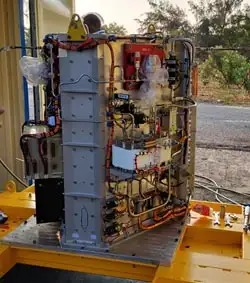In a significant achievement, the Indian Space Research Organisation (ISRO) has successfully conducted a pioneering experiment involving the testing of a 100 W class Polymer Electrolyte Membrane Fuel Cell based Power System (FCPS) in space. This milestone was achieved aboard the orbital platform POEM3, which was launched onboard the PSLV-C58 rocket on January 1, 2024.
The primary objective of this experiment was to evaluate the operational feasibility of Polymer Electrolyte Membrane Fuel cells in the space environment. Additionally, ISRO aimed to gather crucial data to enhance the design of systems for future space missions. The test conducted onboard POEM demonstrated the generation of 180 W power from Hydrogen and Oxygen gases stored in high-pressure vessels. This successful trial provided valuable insights into the performance of various static and dynamic systems within the power system, shedding light on the underlying physics at play.
Hydrogen Fuel Cells, the core technology behind this breakthrough, function by directly converting Hydrogen and Oxygen gases into electricity, with pure water and heat being the only byproducts. Unlike traditional generators that rely on combustion reactions, fuel cells operate on electrochemical principles similar to batteries. This direct conversion process renders them highly efficient, with zero emissions apart from water vapor. Such characteristics make fuel cells highly suitable for space missions involving human presence, where electric power, water, and heat are essential requirements. Furthermore, their versatility allows a single system to fulfill multiple needs during a mission.
Beyond space exploration, fuel cells hold immense potential for societal applications. They represent a promising solution for replacing conventional engines in various types of vehicles and powering standby systems. Compared to batteries, fuel cells offer comparable range and fuel recharge time, making them a preferred choice for emission-free transportation. Moreover, their use in space stations proves advantageous as they provide both power and pure water, essential for sustaining life in space.
ISRO’s successful testing of the fuel cell technology marks a significant step forward in India’s space exploration endeavors. By harnessing this innovative technology, ISRO is poised to enhance the efficiency and sustainability of future space missions while also contributing to the advancement of clean energy solutions on Earth. This achievement underscores India’s prowess in space technology and reaffirms its commitment to exploring new frontiers for the betterment of humanity.
